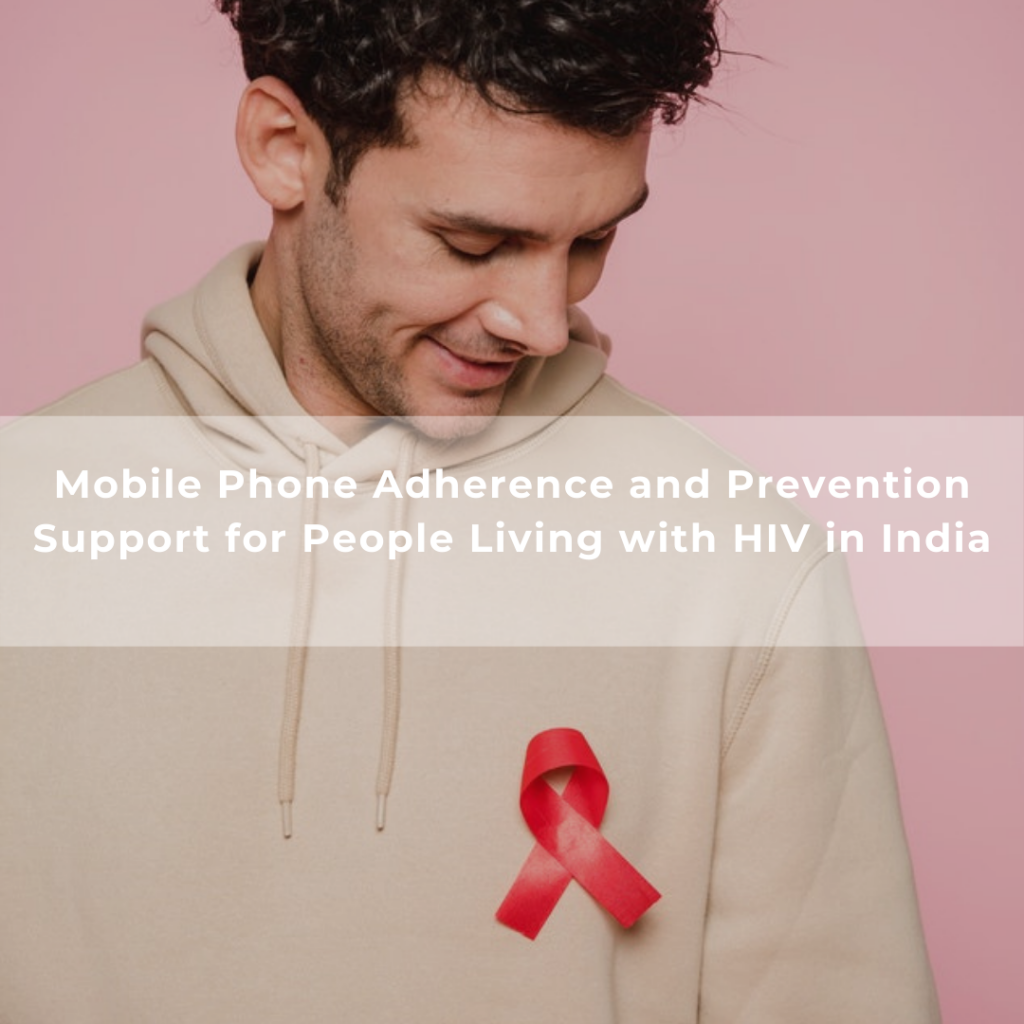
The 2.3 million persons living with HIV (PLH) in India are being offered access to anti-retroviral therapies (ARV) by the government. ARVs offer the possibility of improving the individual’s health and to reduce transmission by decreasing viral load. Yet, non-adherence remains high, typically around 50% (WHO, 2008). Mobile phones have been used in the US and globally to increase ARV adherence among PLH. As a low cost, easily diffused intervention strategy in a country such as India in which the mobile phone penetration rate is expected to reach 74% by 2013 and 101% by 2014 (Informa World, 2010), designing a mobile phone intervention to increase ARV adherence is a potentially highly efficacious intervention. In this proposal, we aim to adapt an existing mobile phone system for ARV adherence for PLH in India. However, because HIV is a chronic infectious disease, PLH are also challenged with maintaining mental health and reducing transmission risks (Swendeman et al., 2009a). Furthermore, reviews and meta-analyses have concluded that ARV adherence interventions are more effective when a comprehensive approach is adopted (Malta, 2008; Rueda, 2006; Simoni, 2006). In particular, mental health symptoms and transmission acts that co-occur with and undermine ARV adherence (Kalichman, 2008, Malta, 2008) are likely to be behaviors that may also be influenced by mobile phone delivered intervention.
This R21 aims to adapt and develop two versions of a mobile phone program to enhance medical adherence: 1) one aimed solely at increasing medication and appointment adherence; and 2) one aimed at increasing adherence, plus reducing mental health symptoms and transmission acts.
Three world-renowned HIV prevention and technology organizations will collaborate: 1) UCLA CHIPTS, with expertise in behavioral intervention development, adaptation, and randomized trials for PLH and other high risk populations; 2) Durbar, with expertise in multi-level prevention and support services for high risk populations in India; and 3) Dimagi Inc., a technology company with expertise in mobile phone solutions for global health challenges. Dimagi has developed “ARemind” to assess and remind ARV and appointment adherence with feedback from PLH and providers in the U.S. and tested in a pilot study and subsequent SBIR funded study. The software assesses and reminds PLH through text messaging (i.e. Simple Messaging Service [SMS]) or Interactive Voice Response (IVR) methods. This program can also be leveraged to address the co-morbid challenges of preventing transmission and improving mental health and quality of life for PLH. In this study, ARemind will be adapted and developed for PLH in Kolkata, India to address the co-morbid challenges of ARV adherence, transmission risk reduction, and poor mental health faced by PLH. ARemind will be adapted and developed for PLH recruited from two sites in Kolkata, India; 1) a community based care and treatment center operated by Durbar serving primarily female sex workers living with HIV (i.e., the Mamata Care & Treatment Center [MCTC]), and 2) PLH recruited from the primary ARV center in Kolkata operated by the Government of India.
In Phase 1 over Year 1, focus groups with PLH (n=10 from each site) and design meetings with the UCLA and Durbar research team and Dimagi programmers will identify acceptable and feasible enhancements to iteratively adapt and pilot test ARemind for PLH in India. In addition, the team will further develop the program into “ARemind Plus” to also address the co-occurring challenges of mental health and transmission risks for PLH. Dimagi will program adaptations, which will be iteratively pilot tested by research teams in Kolkata overseen by Durbar and trained by UCLA, with small groups of PLH (n=10 from each site).
In Phase 2, over Year 2, we will preliminarily evaluate the efficacy of the enhanced system with 400 PLH (n=200 from each site), with PLH randomized within site to ARemind Plus (n=100 each site) compared to ARemind for medication adherence only as standard care control (n=100 each site). PLH will be recruited with informed consent and complete a baseline and 3 follow-up interviews at 2-month intervals over 8 months to assess the impacts of ARemind compared to baseline adherence rates, and the impacts of ARemind Plus compared to ARemind for adherence only. ARemind for medical adherence will be the standard care control because ARemind and other electronic adherence reminders (e.g., beepers, pagers, timers) have already been established as improving ARV adherence. PLH will be provided with low cost mobile phones that cost about the same as one months supply of ARV medication in India (<$25), which could be a cost- effective strategy for eventual scale up. Both the choice of the standard care and mobile phone provision are warranted by values of distributive justice and ethical conduct of research. Finally, from months 22-24, we will collect post-intervention feedback from PLH and providers, conduct data analyses, and prepare ARemind for dissemination and subsequent field trials and adaptations in India.
Specific Aims:
Our aims are to:
1. Adapt the ARemind program for PLH in Kolkata, India;
2. Further develop ARemind to address factors the co-occurring factors of ARV non-adherence, poor mental health, and transmission risks;
3. Examine the acceptability, engagement, and adherence by PLH to the ARemind programs; and
4. Examine the efficacy of ARemind Plus compared to ARemind for medical adherence only to improve adherence and mental health, and reduce transmission risks, in a pilot randomized controlled trial.
Mobile Phone Adherence and Prevention Support for People Living with HIV in India - Research Plan